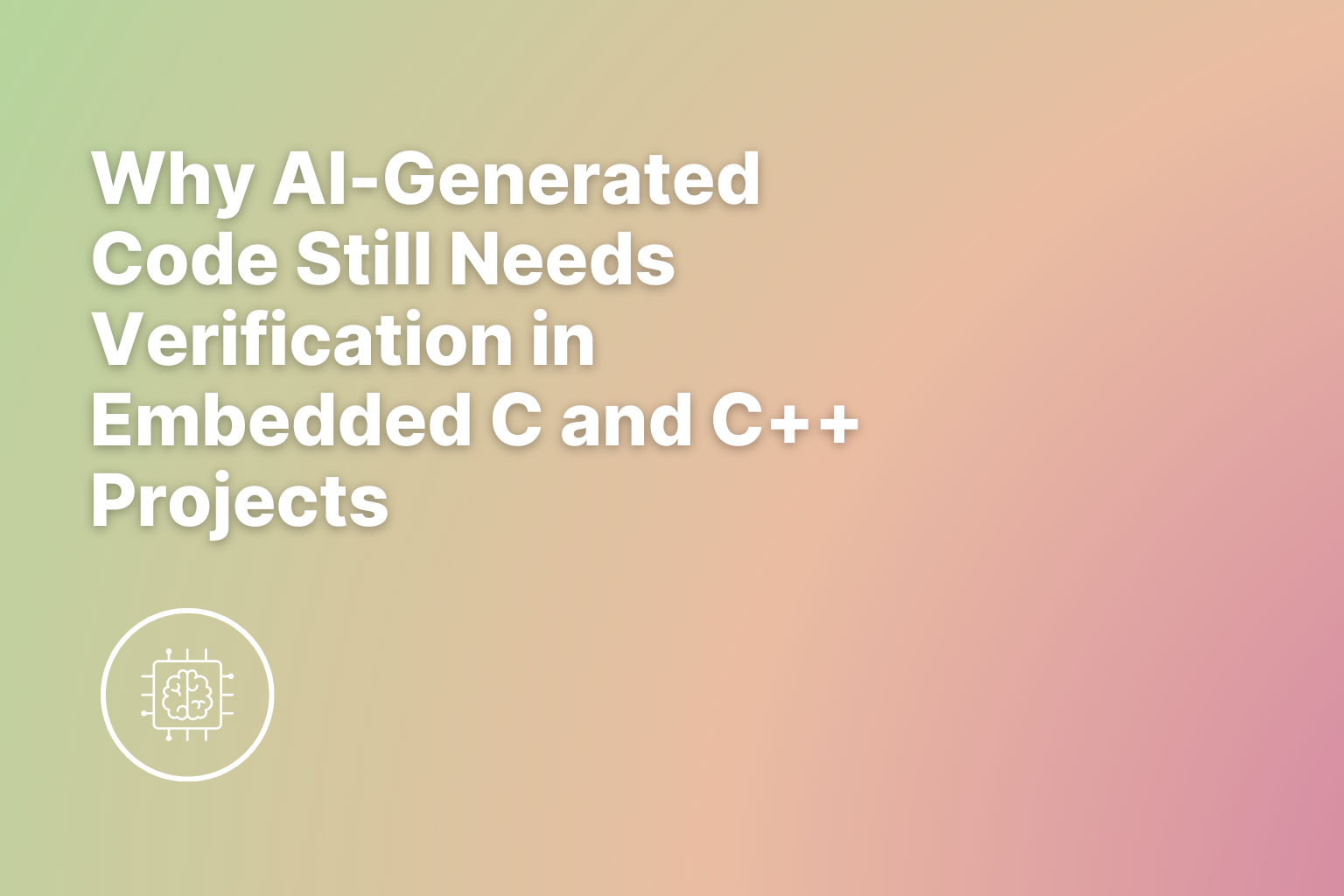The artificial intelligence revolution has transformed software development, but one question remains unanswered: can AI tools like GitHub Copilot and ChatGPT generate truly reliable code? For embedded systems developers working on medical devices, automotive systems, and IoT infrastructure, « almost working » code simply isn’t enough.
This article explores the reality of AI code generation, uncovers the hidden reliability challenges developers face, and presents a breakthrough solution designed to deliver consistent, trustworthy results in real-world projects.
The AI Code Generation Explosion
AI-powered coding tools are experiencing unprecedented growth:
- Claude Code: Generates 195 million lines of code weekly for 115,000+ developers
- GitHub Copilot: Serves 20 million users (added 5 million last quarter alone)
- Developer productivity: 55% reported speed improvements
These numbers paint a picture of widespread adoption, but they only tell half the story.
The Hidden Reliability Crisis
Despite impressive adoption rates, a troubling paradox exists in AI code generation:
The Developer Frustration Statistics
- 66% of developers spend more time fixing « almost-right » AI code than expected
- 45% admit frustration with AI solutions generating incorrect code
For embedded systems developers, these statistics are particularly concerning. When your code controls critical infrastructure, « mostly working » creates serious risks.
Why Embedded Systems Face Unique Challenges
Embedded code requirements go far beyond basic functionality:
- Real-time constraints with microsecond precision
- Memory limitations on resource-constrained hardware
- Power budgets for battery-operated devices
- Safety standards for mission-critical applications
- Hardware-specific optimizations for different processors
Traditional AI tools generate code in isolation. They don’t account for these constraints, leaving developers with code that may run, but not within the bounds of performance, safety, and reliability that embedded applications demand.
Testing AI Code Generation: Shocking Results
We conducted extensive testing using a simple function as a Fast Fourier Transform (FFT) implementation to measure AI code reliability on a textbook case. Our methodology included:
- Multiple AI models: Mistral AI’s Devstral and CodeStral
- Various prompting techniques: Zero-shot and chain-of-thought
- Automated testing: Build error correction loops
- Statistical analysis: Hundreds of test runs for reliable data
The Disappointing Results
Our comprehensive testing revealed sobering truths about traditional AI code generation reliability:
The results were disappointing across all metrics. At best, only 19% of generated code actually worked, meaning it both compiled successfully and validated the core functionality through our test suite. Among this small fraction of working code, 79% performed better than the original implementation, achieving an average 50% performance improvement.
The fundamental issues became clear:
- Very low reliability makes traditional AI unsuitable for production embedded systems
- Very high variability in results, even with identical inputs and prompts
- Hundreds of runs required before achieving good optimization on even simple code like FFT implementations
Bottom line: Traditional AI code generation produces unreliable results with massive variability.
The Solution: The WedoLow MCP Server
The breakthrough solution lies in our WedoLow MCP server (Model Context Protocol), a revolutionary approach that connects AI directly to your development environment.
This approach leverages deep embedded systems expertise. WedoLow has spent years optimizing embedded code, achieving real-world results like 23% execution improvements on Infineon TriCore transmission systems and 45% performance gains on satellite image processing applications. This proven optimization knowledge now powers AI through MCP servers.
Traditional AI vs. WedoLow MCP Server-Enhanced AI
Traditional AI Limitations:
- Generates code in complete isolation
- No access to project context or dependencies
- Cannot validate against actual hardware
- Limited to generic optimization patterns
- Unreliable and inconsistent results
WedoLow MCP Server – Enhanced AI Advantages:
- Direct access to compilers and analyzers
- Real performance data from target hardware
- Iterative optimization with concrete metrics
- Integration with existing development workflows
How The WedoLow MCP Server Works
It provides AI with essential development tools:
- Code analysis capabilities for understanding existing codebases
- Performance profiling tools for measuring optimization impact
- Hardware specifications for platform-specific optimizations
- Build and test systems for immediate validation
Expert knowledge databases accumulated over years of development
Real-World Success Stories
WedoLow MCP Server Results: FFT Optimization Breakthrough
Using the WedoLow MCP server approach on the same FFT challenge that yielded only 19% success rates with traditional AI:
Results:
- Tested across five independent runs for statistical reliability
- 86-92% performance improvements consistently achieved
- 89% average improvement with reliable outcomes
- Comprehensive documentation of all optimizations
This represents a complete transformation from unreliable suggestions to dependable optimization.
WedoLow MCP Server Results: Image Processing Project
The WedoLow MCP server was tested on a complex image rasterization system for the CNES:
Challenge: 3D projection mapping of 2D point grids for satellite image processing
AI-Driven Results with The WedoLow MCP Server:
- 30% performance improvement achieved automatically
- Latency reduced from 369ms to 261ms
- Fully automated optimization with detailed reporting
The AI agent with the WedoLow MCP server access automatically applied multiple optimization techniques:
- Compiler flag optimization for target CPU
- Data type conversions for SIMD operations
- Memory access pattern improvements
- Algorithm-specific enhancements
What This Means for Developers
Immediate Benefits
WedoLow MCP Server-enabled AI code generation offers embedded developers:
Reliability Improvements:
- Consistent optimization results
- Predictable performance gains
- Automated testing and validation
- Zero failed builds
Development Efficiency:
- Hardware-specific optimizations
- Comprehensive change documentation
- Integration with existing toolchains
- Minimal human intervention required
Long-Term Impact
The shift from unreliable code suggestions to a context-aware development partner, as the WedoLow MCP Server, represents a fundamental change in software development:
- Faster development cycles without sacrificing quality
- Consistent optimization results across different projects
- Knowledge preservation through documented optimization decisions
- Reduced technical debt from poorly optimized code
The Future of AI Code Generation
The next generation of AI code tools will move beyond general-purpose models toward smaller, domain-specific systems that deliver more accurate and context-aware results. Companies can expect stronger security, broader platform support across embedded architectures, and greater automation to reduce manual oversight. Most importantly, these tools will integrate more deeply with professional development environments, making validation, testing, and performance optimization core features rather than optional steps, ensuring that AI-generated code is reliable, efficient, and ready for real-world deployment.
Conclusion: The Reliability Revolution
The question “Can AI really generate reliable code?” finally has a clear answer: yes, but only when paired with the right framework.
Traditional AI coding assistants remain limited, producing outputs that are too unpredictable for embedded systems. The WedoLow MCP Server changes that equation by giving AI direct access to compilers, analyzers, profilers, and real performance data. This integration transforms AI from a suggestion tool into a dependable development partner, capable of optimizing and validating embedded C/C++ code with professional-grade rigor.
For developers who have been skeptical about adopting AI due to reliability concerns, the WedoLow MCP Server demonstrates that it is possible to maintain the safety and performance standards required for critical applications while significantly accelerating development cycles.
This is not just an incremental step forward, it’s a fundamental shift that makes AI-assisted development truly viable for the most demanding embedded projects.


.svg)





.svg)